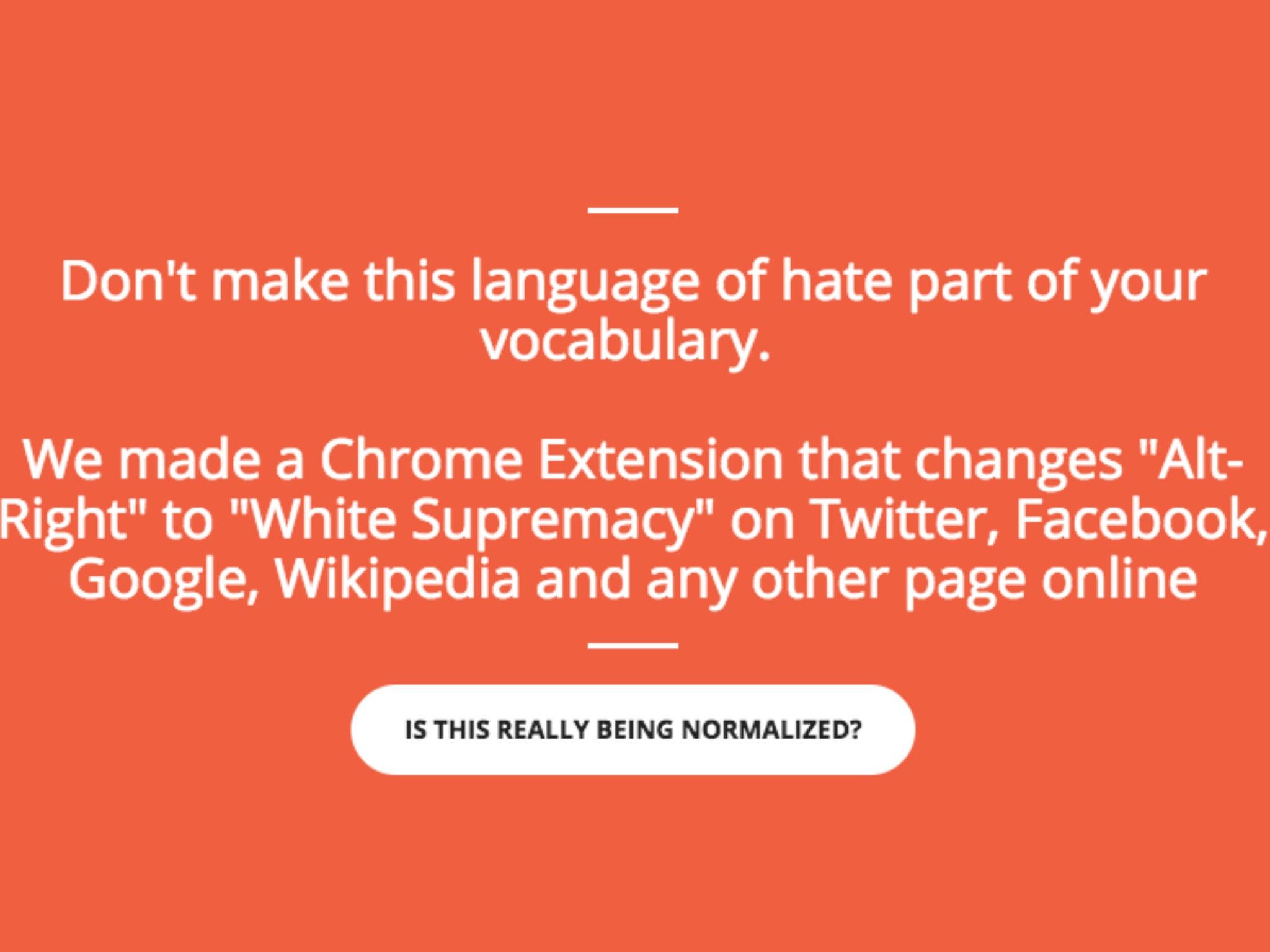Chrome extension changes ‘alt-right’ to ‘white supremacy’ and ‘Neo-Nazi'
The New York-based advertising professional, who goes under a pseudonym, is determined to stop the normalisation of white supremacy

Your support helps us to tell the story
From reproductive rights to climate change to Big Tech, The Independent is on the ground when the story is developing. Whether it's investigating the financials of Elon Musk's pro-Trump PAC or producing our latest documentary, 'The A Word', which shines a light on the American women fighting for reproductive rights, we know how important it is to parse out the facts from the messaging.
At such a critical moment in US history, we need reporters on the ground. Your donation allows us to keep sending journalists to speak to both sides of the story.
The Independent is trusted by Americans across the entire political spectrum. And unlike many other quality news outlets, we choose not to lock Americans out of our reporting and analysis with paywalls. We believe quality journalism should be available to everyone, paid for by those who can afford it.
Your support makes all the difference.The phrase "alt-right" might be new to people’s vocabulary.
But the seemingly new term has an age-old meaning - white supremacy - and one man is determined to stop people using a harmless-sounding term for a dark, racist ideology.
For people who want to make an effort to stop the normalisation of the term “alt-right”, there is now a Chrome Extension that changes the words to "white supremacy" on Twitter, Facebook, Google and any other page online.
Designed by New York-based advertising professional, under the pseudonym George Zola, there is also a new version that changes the words to "Neo-Nazi".
Both editions are available to download.
"I think racist, white supremacist fashions in the US have been emboldened, in large part due to Donald Trump, however we need to also be super careful about painting all supporters as racist," Zola told The Independent.
"A lot of supporters are very rational and moderate people, even though I disagree with them politially. It's not about calling out all Conservatives. I want to find solidarity with the vast majority of people who are not overtly racist."
On the associated Twitter account "#STOPNORMALIZING", the creator describes himself as "part bot, part human", changing one tweet at a time.
The extension became available on 17 November and it has gathered more than 59,000 Facebook shares and close to 2,200 downloads.
He may have a difficult job on his hands as most media outlets have adopted the phrase in the wake of recent news that Twitter was purging "alt-right" accounts, or that Donald Trump’s chief strategist-in-waiting, Stephen Bannon, founded an "alt-right" platform.

Zola has a message for the angry visitors: "Email me with your hateful messages at the email below, but just know how good it makes me feel to piss you off."
He added: "I’m not saying we should ban people who have views we disagree with. I don’t think we should ban the use of the term of 'alt-right'. We should simply provide context around the language we’re using."
White supremacist leader Richard Spencer has been profiled by the likes of Mother Jones and the LA Times, photographed in suits and sunglasses and described as “dapper”. He recently held a conference with other white supremacists who shouted "Heil Trump".
Milo Yiannopoulos, who claimed on Channel 4 News that his boss, Mr Bannon, had made him a "star", has also been given full profiles in publications such as Bloomberg. He has written articles with headlines like: "Would you rather your child had feminism or cancer?"
Mr Trump has been criticised for his delayed disavowal of the Ku Klux Klan, who were jubilant at his win and took partial credit.
The Associated Press, in its style guide, states that "alt-right" may be used in quotes or modified with "so-called" or "self-described".
"Avoid using the term generically and without definition, however, because it is not well known and the term may exist primarily as a public-relations device to make its supporters’ actual beliefs less clear and more acceptable to a broader audience.
"In the past we have called such beliefs racist, neo-Nazi or white supremacist," it reads.
Join our commenting forum
Join thought-provoking conversations, follow other Independent readers and see their replies
Comments